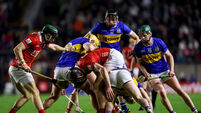US voters and the puzzle of Tin Man versus Scarecrow
He told The New Yorker magazine that his polls include the Oz question: “you live in the Land of Oz, and the candidates are the Tin Man, who’s all brains and no heart, and the Scarecrow, who’s got all heart and no brains. Who would you vote for?”
In 2000, the Saturday before the presidential election, voters were split evenly between the Tin Man and the Scarecrow. This year the Tin Man leads by ten points.














